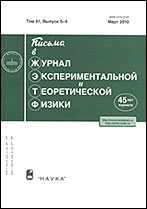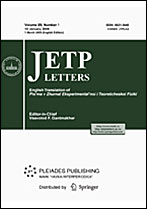|
|
Pis'ma v Zhurnal Èksperimental'noi i Teoreticheskoi Fiziki, 2002, Volume 76, Issue 11, Pages 799–804
(Mi jetpl2996)
|
 |
|
 |
This article is cited in 1 scientific paper (total in 1 paper)
MISCELLANEOUS
How behavior of systems with sparse spectrum can be predicted on a quantum computer
Yu. I. Ozhigov
Insitute of Physics and Technology, Russian Academy of Sciences, Moscow
Abstract:
Call a spectrum of Hamiltonian $H$ sparse if each eigenvalue can be quickly restored within $\varepsilon$ from its rough approximation within $\varepsilon_1$ by means of some classical algorithm. It is shown how a behavior of system with sparse spectrum up to time $T={(1-\rho)}/{14\varepsilon}$ can be predicted on a quantum computer with the time complexity $t={4}/{(1-\rho)\varepsilon_1}$ plus the time of classical algorithm, where $\rho$ is the fidelity. The quantum knowledge of Hamiltonian eigenvalues is considered as the new Hamiltonian $W_H$ whose action on each eigenvector of $H$ gives the corresponding eigenvalue. Speedup of an evolution for systems with the sparse spectrum is possible because for such systems the Hamiltonian $W_H$ can be quickly simulated on the quantum computer. For an arbitrary system (even in the classical case) its behavior cannot be predicted on a quantum computer even for one step ahead. By this method we can also restore the history with the same efficiency.
Received: 01.04.2002
Revised: 30.10.2002
Citation:
Yu. I. Ozhigov, “How behavior of systems with sparse spectrum can be predicted on a quantum computer”, Pis'ma v Zh. Èksper. Teoret. Fiz., 76:11 (2002), 799–804; JETP Letters, 76:11 (2002), 675–680
Linking options:
https://www.mathnet.ru/eng/jetpl2996 https://www.mathnet.ru/eng/jetpl/v76/i11/p799
|


| Statistics & downloads: |
| Abstract page: | 154 | | Full-text PDF : | 60 | | References: | 41 |
|





 Contact us:
Contact us: Terms of Use
Terms of Use
 Registration to the website
Registration to the website Logotypes
Logotypes








 Citation in format
Citation in format 
